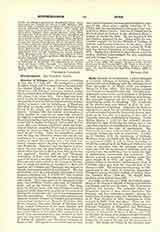

Gunther of Cologne (also GUNTHAR), archbishop of that city, d. July 8, 873. He belonged to a noble Frankish family and, if we may believe the poet Sedulius Scottus (Carm. 68 sqq. in “Mon. Germ. Hist.”, Poetae Lat., III, 221 sqq.), was a man of great ability. He was consecrated Archbishop of Cologne on April 22, 850 (Annal. Col., ad an. 850). For a long time he refused to cede his suffragan Diocese of Bremen to St. Ansgar who, in order to facilitate his missionary labors, desired to unite it with his Archdiocese of Hamburg. The affair was finally settled (c. 860) by Nicholas I in favor of St. Ansgar, and Gunther reluctantly consented. Gunther, who had become arch-chaplain of King Lothair II, received an unenviable notoriety through his unjustifiable conduct in the divorce of this licentious king from his lawful wife Thietberga. At a synod held at Aachen in January, and another in February, 860, a few bishops and abbots, under the leadership of Gunther, compelled Thietberga to declare that before her marriage with the king she had been violated by her brother. Upon her compulsory confession the king was allowed to discard her and she was condemned to a convent. At a third synod held at Aachen in April, 862, Gunther and a few other Lorrainese bishops allowed the king to marry his concubine Waldrada. Nicholas I sent two legates to investigate the case, but the king bribed them, and at a synod which they held in Metz in June, 863, the divorce was approved. Gunther and his tool Thietgaud, Archbishop of Trier, were bold enough to bring the acts of the synod to the pope and ask for his approval. The pope convened a synod in the Lateran in October, 863, at which the decision of the Synod of Metz was rejected, and Gunther and Thietgaud, who refused to submit, were excommunicated and deposed. The two archbishops drew up a calumnious document of seven chapters (reprinted in P.L., CXXI, 377-380) in which they accused the pope of having unjustly excommunicated them. They sent copies of the document to the pope, the rebellious Photius, patriarch of Constantinople, and to the bishops of Lorraine. The pope, however, did not waver even when Emperor Louis II appeared before Rome with an army for the purpose of forcing him to withdraw the ban of excommunication from the archbishops. Though excommunicated and deposed, Gunther returned to Cologne and performed ecclesiastical functions on Maundy Thursday, 864. When, however, the other bishops of Lorraine and King Lothair submitted to the pope, Gunther and Thietgaud appeared before the synod which the pope convened at Rome in November, 864, asking to be released from excommunication and restored to their sees, but they were unsuccessful. After the accession of Adrian II, Gunther and Thietgaud returned to Rome in 867. Thietgaud was now freed from the ban, but Gunther remained excommunicated until the summer of 869, when, after a public retraction (P.L., CXXI, 381), he was admitted by the pope to lay communion at Monte Cassino. The See of Cologne had in 864 been given by Lothair to the subdeacon Hugo, a nephew of Charles the Bald. He was deposed in 866 and Gunther regained his see. Being under the ban, Gunther engaged his brother Hilduin of Cambrai to perform ecclesiastical functions in his place. After the death of Gunther’s protector, Lothair II, Willibert was elected Archbishop of Cologne (January 7, 870). Seeing that all efforts to regain his see would be useless, Gunther acknowledged the new archbishop and left Cologne for good.
MICHAEL OTT

